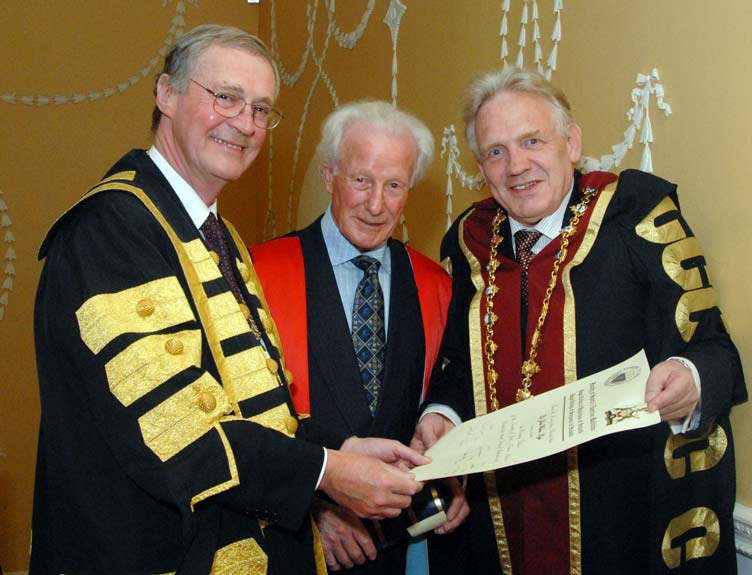Three Honorary Fellows conferred at scientific conference

The Annual Scientific Conference of the Faculty of Sports and Exercise Medicine, RCPI and RCSI, took place from 21-22 September at RCSI.
Renowned former Irish rugby international Dr Jack Kyle was awarded with an honorary fellowship on Saturday, 22 September along with Professor Norbert Bachl, Dean of the Faculty of Sports Science and University Sports Institute of Vienna, Austria and Professor Fabio Pigozzi, Professor of Sport Medicine and Director of the Sports Medicine Unit at the University of Rome.
Jack received his first International rugby cap in 1947. He guided Ireland to a grand slam in 1948, and went on to play a remarkable seven consecutive championship seasons before injury removed him temporarily from the scene in 1954.
He returned the following year and carried on playing for four more years, by which time he was the most capped player of all time. Touring New Zealand and Australia in 1950 with the Lions was probably Jack Kyle’s finest rugby hour. He played in 20 of the 29 games, including all six Tests. He is widely regarded as one of the finest rugby fly-halves of all time. In 1999 he was inducted in the International Rugby Hall of Fame. Following his retirement from club rugby, in 1966 he emigrated to Chongola, Zambia, where he worked for many years as a medical missionary.
During his stay of nearly 35 years in Zambia, he developed an interest and expertise in abdominal surgery. He regularly carried out surgery on patients infected with many dangerous diseases, and continued to do this with no regard to any inherent danger to himself. There are countless thousands in former northern Rhodesia who were glad that they had met the gentle surgeon from Belfast.
His former team mates and colleagues confirm that it was the patience and tranquility, which he brought to his life and work which made him such a special sportsman and doctor.
In his retirement to his native Belfast, Dr Jack Kyle continues to work for the betterment of his society, through his links with his alma mater, Queens University, through the Rugby Academy and the Jack Kyle Bursary Fund at Queen's University Belfast. He works with children with learning disabilities in Armagh; and is also involved with the Wooden Spoon Society; a major rugby charity in the UK which raises funds for disadvantaged children and young people.
Prof Norbert Bachl, Dean of the Faculty of Sports Science and University Sports Institute, of Vienna, Austria, has been associated with sports medicine since his original appointment as Assistant Professor of the Department of Sports Physiology under the tutelage of Prof Ludwig Prokop of Vienna in 1974. He went on to publish over 40 papers with his mentor and followed him as chief medical officer of the Austrian Olympic Teams in 1984 and 1988.
He has studied strength behaviour of arm and leg muscles during short and extended space flight on the Mir Space Station. He studied the effects of muscular deconditioning during long-term spaceflight. This work on the Russian space program, lead to the development of diagnostic tests of muscle strength and the development of exercise programs to prevent bone loss in the weightlessness of outer space. Exercise recommendations to optimize crew performance and treat muscle strength properties for Cosmonauts experiencing the microgravity of weightlessness and hypokinesia during long-term spaceflight.
Professor Fabio Pigozzi, Professor of Sport Medicine and Director of the Sports Medicine Unit at the University of Rome began his career in sports medicine in 1987 and has since become a leader in European Sports and Exercise Medicine with his involvement on Olympic committees, the European Federation of Sports Medicine Associations and the International Federation of Sports Medicine. His academic work in sports cardiology is partly responsible for the European position on pre-participation assessment and his other publications on sports cardiology are at the cutting edge of this sub-speciality of sports medicine.
He has also made a significant contribution in the areas of sports nutrition, anti-doping and Asthma in sport. He, along with others, is currently negotiating with the European Union of Medical Specialists to ensure European Sports medicine is a recognised sub-speciality of medicine.



